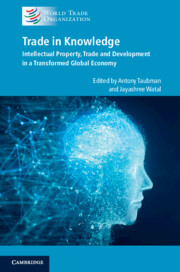Book contents
- Frontmatter
- Contents
- Figures
- Tables
- Contributors
- Preface
- 1 Thematic Overview: Charting the Evolution of Knowledge Flows
- Part I Conceptual Framework
- Part II Measuring Trade in Knowledge
- Part III Impact of Knowledge Flows on Trade and Development
- Part IV Policy, Regulatory and Legislative Frameworks
- Part V Looking Forward
- Index
23 - The Need for a Global Framework for Knowledge Transactions: Cross-Border Licensing and Enforcement
from Part IV - Policy, Regulatory and Legislative Frameworks
Published online by Cambridge University Press: 17 February 2022
- Frontmatter
- Contents
- Figures
- Tables
- Contributors
- Preface
- 1 Thematic Overview: Charting the Evolution of Knowledge Flows
- Part I Conceptual Framework
- Part II Measuring Trade in Knowledge
- Part III Impact of Knowledge Flows on Trade and Development
- Part IV Policy, Regulatory and Legislative Frameworks
- Part V Looking Forward
- Index
Summary
Knowledge-based IP transactions are of vital importance to the modern global economy. The IP and information products that trade by license are no less important to this century than goods were to the last (and are now). Yet, there is still no recognized, general statement of the commercial legal principles dealing with the unique but common transactional form of license (like the unique transactional form of sale) and the unique but common qualities of knowledge-based intangibles. Various private ordering regimes have emerged to address discrete types of transactions, whether by industry or other groups. One form of private ordering – “information law merchant” – covers only a limited number of participants who routinely trade in certain types of information assets. Effective participation in many forms of international commercial IP transactions often requires access to specialized legal knowledge, extensive commercial experience, and elaborate contract forms, creating barriers to entry for new actors, disadvantaging smaller firms, increasing transaction and performance costs, and fostering disputes. Another form of private ordering relates to FRAND licensing. Recent developments show a piecemeal and equally fragmented development of FRAND licensing terms and conditions (beyond the issue of the financial remuneration or royalties) provides no firmer foundation for addressing the general commerce in IP assets.
In short, the authors believe that, just as international organizations created to foster global commercial trade and finance analyzed and fashioned frameworks of contractual principles for sales of goods and secured financing, those international organizations and the organizations created to foster intellectual property protection and access should undertake a project to address the general principles relating to international IP commercial contracts.
- Type
- Chapter
- Information
- Trade in KnowledgeIntellectual Property, Trade and Development in a Transformed Global Economy, pp. 685 - 737Publisher: Cambridge University PressPrint publication year: 2022

